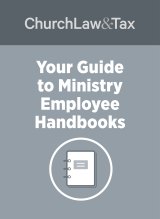
Is it legal to add something to a pastoral staff hiring agreement stating that if a pastor or ministry staff person is dismissed or resigns, they agree not to accept employment in any church within a 30 mile radius of our church for three years after their termination date?
This type of agreement or language is often referred to as a “non-compete” agreement. Non-compete agreements are common in the business world, but can be used by not-for-profit religious institutions to limit certain key employees’ options when he or she terminates. Whether a non-compete agreement will be upheld varies state by state, however, most will allow it as long as certain conditions are met.
In most cases, courts will look to whether the agreement was reasonable in scope, geography and term. Here are examples of language that likely would or would not be upheld:
Reasonable: Reverend Smith agrees not to accept a pastoral position with any Baptist church within 30 miles of First Baptist Church for two years following termination. A pastoral position means a job where the primary responsibilities include preaching, teaching, leading worship, or overseeing a Church.
Unreasonable: Reverend Smith agrees not to accept any position with any church in the State of California for five years following termination with First Baptist Church.
Additionally, some states require “additional consideration” (i.e. money or tangible benefit) in order for the agreement to be binding, especially if the agreement is signed after the employee is already employed. As with all agreements, you should have a local attorney review non-compete language to confirm that it complies with your state laws.
Related Topics: Employment | Policies Posted: January 23, 2009This content is designed to provide accurate and authoritative information in regard to the subject matter covered. It is sold with the understanding that the publisher is not engaged in rendering legal, accounting, or other professional service. If legal advice or other expert assistance is required, the services of a competent professional person should be sought. "From a Declaration of Principles jointly adopted by a Committee of the American Bar Association and a Committee of Publishers and Associations." Due to the nature of the U.S. legal system, laws and regulations constantly change. The editors encourage readers to carefully search the site for all content related to the topic of interest and consult qualified local counsel to verify the status of specific statutes, laws, regulations, and precedential court holdings.

If updated regularly, an employee handbook can offer valuable legal protection against civil court claims made by disgruntled staff members.